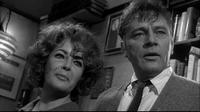Who's Afraid of Virginia Woolf? (1966)
Published Thursday, September 15, 2005 by modium | E-mail this post Who's Afraid of Virginia Woolf? (1966)
Who's Afraid of Virginia Woolf? (1966)My wonderful friend Nichole recently got Netflix, so we went back and forth for the better part of a night, recommending films to one another. I filled hers with Bergman, Cronenberg and Godard, while she insisted that I MUST MUST MUST see Who's Afraid of Virginia Woolf? I'd wanted to see it anyway, so with a push like that, i was off and running.
What struck me most about the film was its sheer power. Some films try too hard to adopt a faux-documentary style to make things seem more real. Yet, Virginia Woolf owes its level of reality to great acting, well-defined characters and an unobtrusive style. Sometimes, you can tell when a story was adapted from a stage work. I suppose you could say the same about Virgina Woolf, but you're so absorbed in the film that you don't notice. I really got the feeling that was watching the disintegration of a marriage right before my own eyes.
We're left to wonder what happened at the end. Did Martha and George behave like this because they were drunk, or is this their normal way of behavior? Is it all simply a result of Martha letting a small secret slip? Is this something that's been building up? It could be any combination of these things, really, and the joy of the film is trying to decide for yourself why these things happened. I use the word 'joy' hesitantly, because there's no joy in the film. It's a draining experience to go through.
Towards the end of the film, after Martha and Nick have slept together, she drifts back to George, as they go back to laughing and hurling verbal javelins at one another. They've re-aligned, as the audience assumes they always do, and have left Nick and his marriage on unstable ground. They joke around with each other, making up elaborate facades, and the following exchange takes place:
Martha: That is not true. That is such a lie!
George: You must not call everything a lie, Martha. Must she?
Nick: I don't know when you people are lying or what.
Martha: You're damn right!
George: You're not supposed to.
The frame from the film, above, shows the skewed camera angle during this moment, heightening the abstract and frightening effect they have on Nick. Though, it also serves as a subliminal landmark for the viewer, as the idea of lying is about to come into question, when the fate of their child is revealed.
After all is revealed, Nick and Honey exit and the camera shoots everyone from a high angle. The camera adopts a very subjective angle, looking down on the characters, as they've got nothing left to hide. Also, it serves to show the horrible state that the characters and their environment are left in, the physical and psychological mess that they now have to deal with.
0 Comments:
modium
- Rhode Island, United States
- My profile
Links
Other Nerds
Previous posts
Archives
- 2005-06-26
- 2005-07-03
- 2005-07-10
- 2005-07-17
- 2005-07-24
- 2005-07-31
- 2005-08-07
- 2005-08-14
- 2005-08-21
- 2005-08-28
- 2005-09-04
- 2005-09-11
- 2005-09-18
- 2005-09-25
- 2005-10-02
- 2005-10-09
- 2005-10-16
- 2005-10-23
- 2005-11-06
- 2005-11-27
- 2006-01-29
- 2006-03-26
- 2006-04-02
- 2006-04-09
- 2006-04-30
- 2006-05-07
- 2006-05-28
- 2006-06-25
- 2006-07-09
- 2006-07-23
- 2006-08-06
- 2006-08-27
- 2006-09-03
- 2006-09-10
- 2006-09-17
- 2006-10-08
- 2006-11-19
- 2006-11-26
- 2006-12-03
- 2007-02-25
- 2007-06-17
- 2008-05-11
- 2008-05-25
- 2008-06-01
- 2008-06-22

